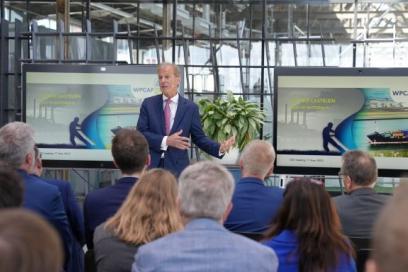- NOUS CONNAÎTRE
- MARCHANDISES
- Une orientation multi-filière
- Une offre maritime de premier plan
- Une offre multimodale attractive
- Une offre short sea élargie
- Terminaux portuaires et quais à usage partagé
- Bonneuil-sur-Marne
- Bruyères-sur-Oise
- Gennevilliers
- La Bourdonnais
- Limay - Porcheville
- Longueil-Sainte-Marie
- Quai Dresser
- Saint-Ouen-l'Aumône
- Terminal conteneurs et marchandises diverses (TCMD)
- Terminal de France
- Terminal de Honfleur
- Terminal de Radicatel
- Terminal de Rouen Quevilly
- Terminal de Saint-Wandrille
- Terminal de l’Atlantique
- Terminaux Nord
- Terminaux conteneurs
- Terminaux de Normandie
- Évry-Courcouronnes
- Plateformes multimodales
- Port 2000
- Terminaux vracs solides
- Terminaux vracs liquides
- Terminaux conventionnels
- Terminal roulier
- Quais à usage partagé
- Des services aux navires de qualité
- Un passage de la marchandise fluide et facilité
- Un port qui affiche ses performances
- PASSAGERS
- MULTIMODALITÉ
- TRANSITION ÉCOLOGIQUE
- INNOVATION
The world has changed drastically in the past five years and climate is at the top of the international agenda today, including in the shipping industry. This is in part due to programs like WPCAP which have an important role to play.
Faster adoption of shore power
In the past years, WPCAP has significantly contributed to the faster adoption of shore power at ports, helping to reduce emissions of CO2 and pollutants while ships are at berth.
WPCAP members developed a global overview of existing facilities and best practice guidelines on their technical, operational and economic implementation and ports in Northwest Europe agreed on the faster adoption of shore power in an MoU.
The WPCAP ports present here in Rotterdam are planning more than 160 connection points with a total investment plan of more than 500 million euros. The CEOs discussed the benefits of shore power, including improved air quality and a better working environment for shipping crews.
A recent study from CE Delft for the WPCAP working group shows that shore power will be part of the long-term maritime fuel mix and especially when ships will have to shift to expensive fossil free fuels. The working group is bringing this message to the maritime shipping industry and continues advocating its global implementation.
Setting the standard for cleaner fuels
The second focus area for WPCAP in the coming years is to facilitate the bunkering and adoption of cleaner fuels. The ports have worked with the IAPH Clean Marine Fuels working group to create a Port Readiness Framework, a self-assessment and communications tool that allows various stakeholders to understand the different levels of research, development and deployment of new fuels at ports around the world.
Green Corridors to play a key role in the transition
Where the fuel readiness framework will set the standard for the bunkering of new fuels, green corridor initiatives are seen as key to facilitate the deployment of fuels in practice, particularly on longer international shipping routes. Now it is time to put this into action and work together as ports to bring fuel suppliers and shippers on board so that we see the first sustainable vessels on these international routes within the next few years.
WPCAP member ports are already part of five green corridor initiatives, spanning routes around the globe from Singapore and Shanghai to LA, Vancouver and Rotterdam, and WPCAP members agreed to set an example and enable the deployment of more low- and zero carbon vessels along these routes in the coming years.
The need for regional leadership and cooperation
The CEOs called on regional coalitions of the willing to set standards and lead the way for the IMO and the international shipping industry to put in place regulation that will allow the sustainable development of the industry in a level playing field. The need for a just transition was also emphasized in the discussion, noting the southern hemisphere should also benefit in particular from opportunities in the development of renewable energy sources and fuels. Cooperation between global ports, IAPH and other front runners will play a key role in this.
